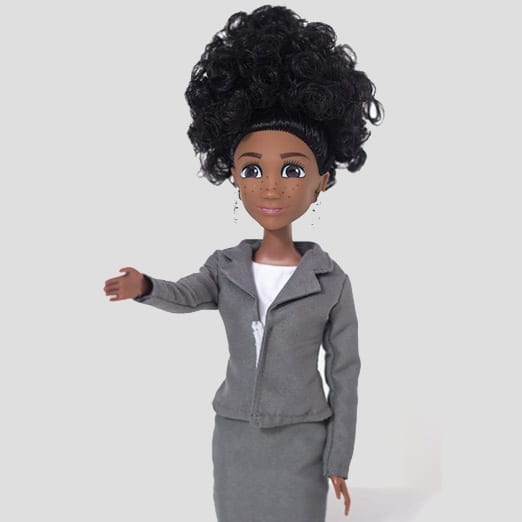The Black Doll Brand Inspiring Children To Aspire To Greatness: Interview With Biankha And Friends
Biankha And Friends is a black doll, accessories and animation company built to empower, educate and inspire children. In creating this powerful, multifaceted role model who loves her skin and all it represents, founder Charlotte Francis and her ‘mini-CEO’ daughter are tackling prevalent self-esteem issues in the young black community. In this interview, Charlotte tells us exactly why creating Biankha was so important to her.
Tell us about Biankha And Friends. Why did you create the brand?
I created Biankha, alongside my nine year-old daughter, when she fell out of love with her natural hair after starting school. My daughter Cali began expressing a dislike for her hair and heritage after not identifying with anyone in her school and receiving some hurtful comments from other children. We embarked on a self-love journey together and couldn’t find the black dolls we were looking for. This resulted in us sitting down together at the end of 2016 and designing some together, to then launch in August 2018.

CEO Biankha doll
How did you design the Biankha doll? Tell us about the different ‘characters’.
We wanted Biankha to represent the modern day Black British girl who is multifaceted and confident. It was important to us that her hair was of a natural texture, she had little makeup on, and was unique. In order to achieve all of this and to ensure no one could replicate her, we had to have a mold made.
My daughter and I have designed everything ourselves, from what Biankha looks like down to the packaging and all the written content that comes with her. Our first two dolls are Natural Biankha, who is all about embracing your natural beauty, and CEO Biankha, who in her power suit rocks her natural hair whilst aspiring to be the best version of herself.
Our next two dolls will be Traditional Biankha, who is all about embracing Africa and tradition, and then Queen Biankha, who is dressed as Queen Nefertiti and encourages children to know their true history.
What kind of reception has Biankha And Friends received?
We have been overwhelmed with the reaction to our Biankha And Friends brand. Our favourite thing to do is to attend events and watch the reactions of the little girls that find us. It’s like at first there’s a sudden bewilderment as they see all the purple and gold, and then when they register who we are and what we offer, the way they run to us is so emotional. Adults react in a similar way and I am humbled by all the gratitude they give for us producing our Biankha dolls.
As a high school teacher and a mother, what have you observed about levels of self-confidence in young black children? Why is representation important?
Unfortunately, my daughter’s self-esteem issues surrounding her hair when starting school are not unique. My daughter will still point out now when there is not a single black person in the things she sees, such as on television and in films. It’s so important that children see themselves in positions of power, success and happiness because it tells them that they can achieve that too. Also, being in an environment whether you are an adult or child, where you are not represented, often leads to feelings being suppressed, communication channels being severed and a feeling of powerlessness.
In my role as a teacher to teenage girls, I have also seen a consistent pattern of low self-esteem amongst them, difficulty in expressing themselves and a long and slow process which eventually saps their very essence, which won’t be alien to them in the real world unfortunately.
In 2020, dolls with darker skin tones are still unfortunately not all that common. Is representation amongst children’s products in general improving at all?
I think up until recently, we have complained about the West not catering for us and our children, which has always fallen on deaf ears. What is beautiful to see is that we are finally taking control of something that belongs to us anyway and creating the most beautiful options that enable our children to feel included. The harsh truth is that big corporations don’t really care otherwise they would have done something a while ago. Representation amongst children’s products is improving, but only because we have been proactive in creating these new opportunities.

Natural Biankha doll
You’ve said your daughter came home from school one day and wished she could have “straight, yellow hair”. What’s one thing you wish you could tell all young black people struggling to love themselves?
I would tell them to research who they derive from – not just what the textbooks in school shine a light on, but the majestic civilisations that existed before African people were enslaved. I would tell them that we were taught to not love ourselves, but it’s time now to unite, look inwards at the strength and magic that was passed down to us, and embrace it.
Tell us about what’s coming next in the Biankha And Friends range.
We are really excited about the next chapter for Biankha. Very shortly we will be launching Biankha’s very own fashion range, a range of new beautiful children’s accessories – which have surpassed all of my expectations – and the pilot episode for our new Biankha animation, which I can’t quite believe has materialised from what I thought up in my imagination. Everything we are bringing to the table has the same ethos for our dolls: to empower, educate and inspire all children to become pillars of our community.
Get 15% off Biankha And Friends with your Jamii card here